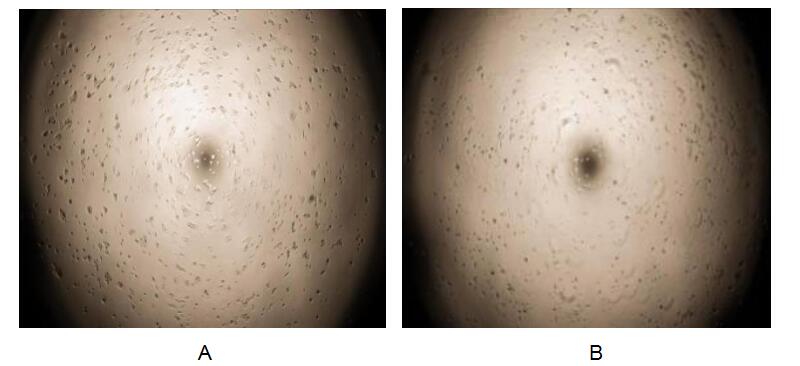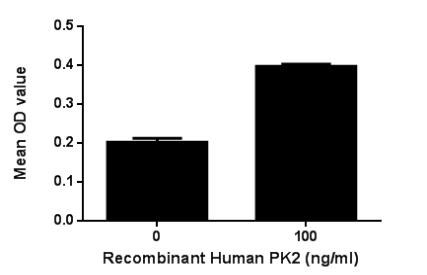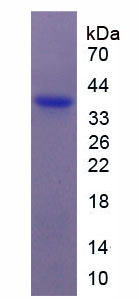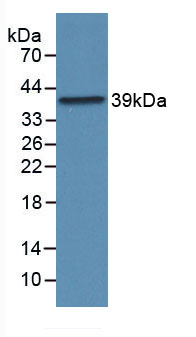Active Prokineticin 2 (PK2) 

PK-2; Bv8; MIT1; KAL4; Protein Bv8 Homolog
- UOM
- FOB US$ 266.00 US$ 666.00 US$ 1,332.00 US$ 3,996.00 US$ 9,990.00
- Quantity
Overview
Properties
- Product No.APA115Hu02
- Organism SpeciesHomo sapiens (Human) Same name, Different species.
- ApplicationsCell culture; Activity Assays.
Research use only - DownloadInstruction Manual
- CategoryNeuro science
- Buffer Formulation20mM Tris, 150mM NaCl, pH8.0, containing 1mM EDTA, 1mM DTT, 0.01% SKL, 5% Trehalose and Proclin300.
- Traits Freeze-dried powder, Purity > 95%
- Isoelectric Point10.2
Sign into your account
Share a new citation as an author
Upload your experimental result
Review

Contact us
Please fill in the blank.
Activity test

Figure. Cell proliferation of HCT116 cells after stimulated with PK2.
Prokineticin 2 (PK2) is a memeber of prokineticin family. Prokineticin is a secreted protein that potently contracts gastrointestinal smooth muscle. They are thought to be involved in several important physiological processes like neurogenesis, tissue development, angiogenesis, and nociception. Other important physiological roles the Bv8/Prokineticins (PKs) are involved in may include cancer, reproduction, and regulating physiological functions that influence circadian rhythms like hormone secretion, ingestive behaviors, and the sleep/wake cycle. To test the effect of PK2 on cell proliferation, HCT116 colon cancer cells were seeded into triplicate wells of 96-well plates at a density of 5,000 cells/well and allowed to attach, replaced with serum-free overnight, then the medium was replaced with 2% serum standard DMEM containing various concentrations of recombinant human PK2. After incubated for 96h, cells were observed by inverted microscope and cell proliferation was measured by Cell Counting Kit-8 (CCK-8). Briefly, 10µL of CCK-8 solution was added to each well of the plate, then the absorbance at 450nm was measured using a microplate reader after incubating the plate for 1-4 hours at 37℃. Proliferation of HCT116 cells after incubation with PK2 for 96h observed by inverted microscope was shown in Figure 1. Cell viability was assessed by CCK-8 (Cell Counting Kit-8) assay after incubation with recombinant PK2 for 96h. The result was shown in Figure 2. It was obviously that PK2 significantly increased cell viability of HCT116 cells.
(A) HCT116 cells cultured in DMEM, stimulated with 100ng/mL PK2 for 96h;
(B) Unstimulated HCT116 cells cultured in DMEM for 96h.

Figure. Cell proliferation of HCT116 cells after stimulated with PK2.
Usage
Reconstitute in 20mM Tris, 150mM NaCl (pH8.0) to a concentration of 0.1-1.0 mg/mL. Do not vortex.
Storage
Avoid repeated freeze/thaw cycles. Store at 2-8°C for one month. Aliquot and store at -80°C for 12 months.
Stability
The thermal stability is described by the loss rate. The loss rate was determined by accelerated thermal degradation test, that is, incubate the protein at 37°C for 48h, and no obvious degradation and precipitation were observed. The loss rate is less than 5% within the expiration date under appropriate storage condition.
Increment services
-
 BCA Protein Quantification Kit
BCA Protein Quantification Kit
-
 Molecular Mass Marker for Protein
Molecular Mass Marker for Protein
-
 Monoclonal Antibody Customized Service
Monoclonal Antibody Customized Service
-
 Polyclonal Antibody Customized Service
Polyclonal Antibody Customized Service
-
 Protein Activity Test Experiment Service
Protein Activity Test Experiment Service
-
 Electrophoretic Mobility Shift Assay (EMSA) Experiment Service
Electrophoretic Mobility Shift Assay (EMSA) Experiment Service
-
 Buffer
Buffer
-
 Lentivirus Packaging Experiment Service
Lentivirus Packaging Experiment Service
-
 Adenovirus Packaging Experiment Service
Adenovirus Packaging Experiment Service
-
 Real Time PCR Experimental Service
Real Time PCR Experimental Service
-
 Spike RBD Protein (S-RBD)
Spike RBD Protein (S-RBD)
-
 Protein G
Protein G
-
 Protein A
Protein A
Citations
- Roles of Prokineticin 2 in Subarachnoid Hemorrhage-Induced Early Brain Injury via Regulation of Phenotype Polarization in AstrocytesPubmed: 32572760
- Differential inflammation-mediated function of prokineticin 2 in the synovial fibroblasts of patients with rheumatoid arthritis compared to osteoarthritis









